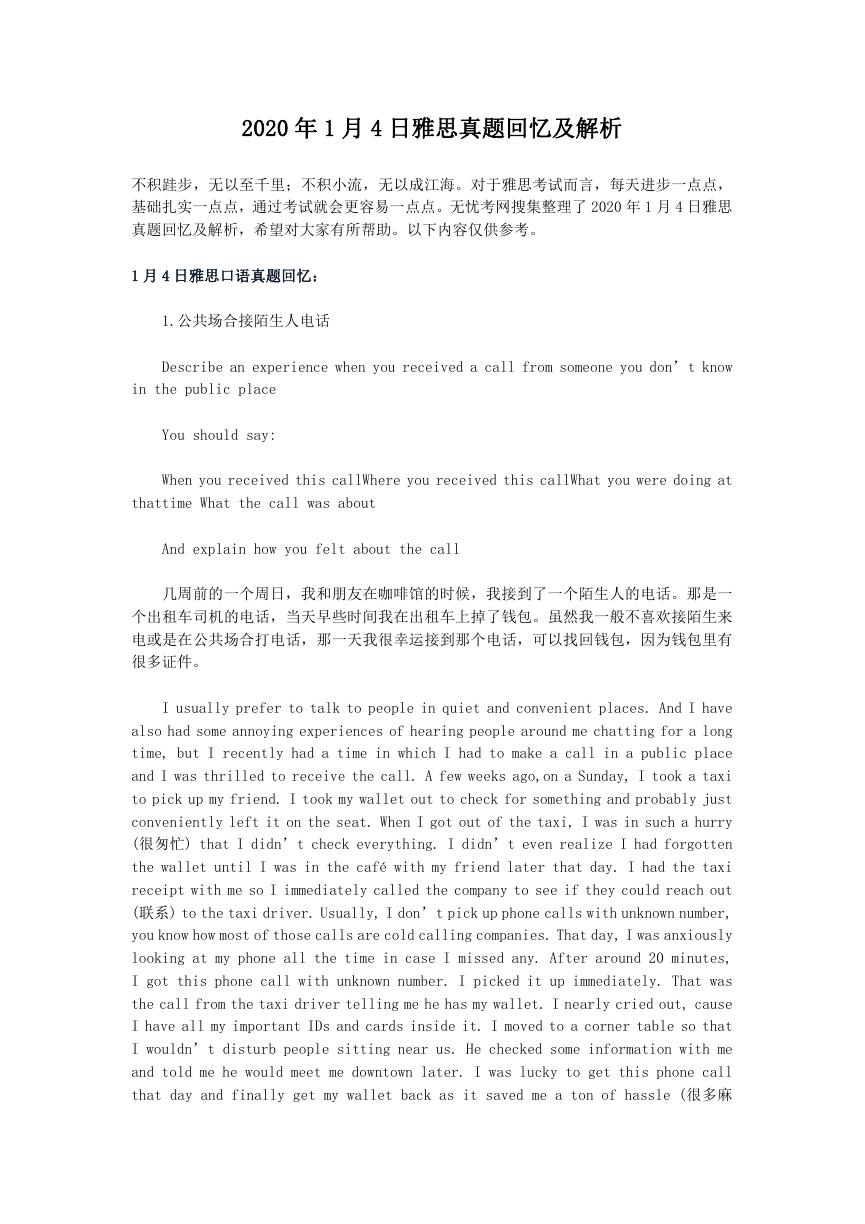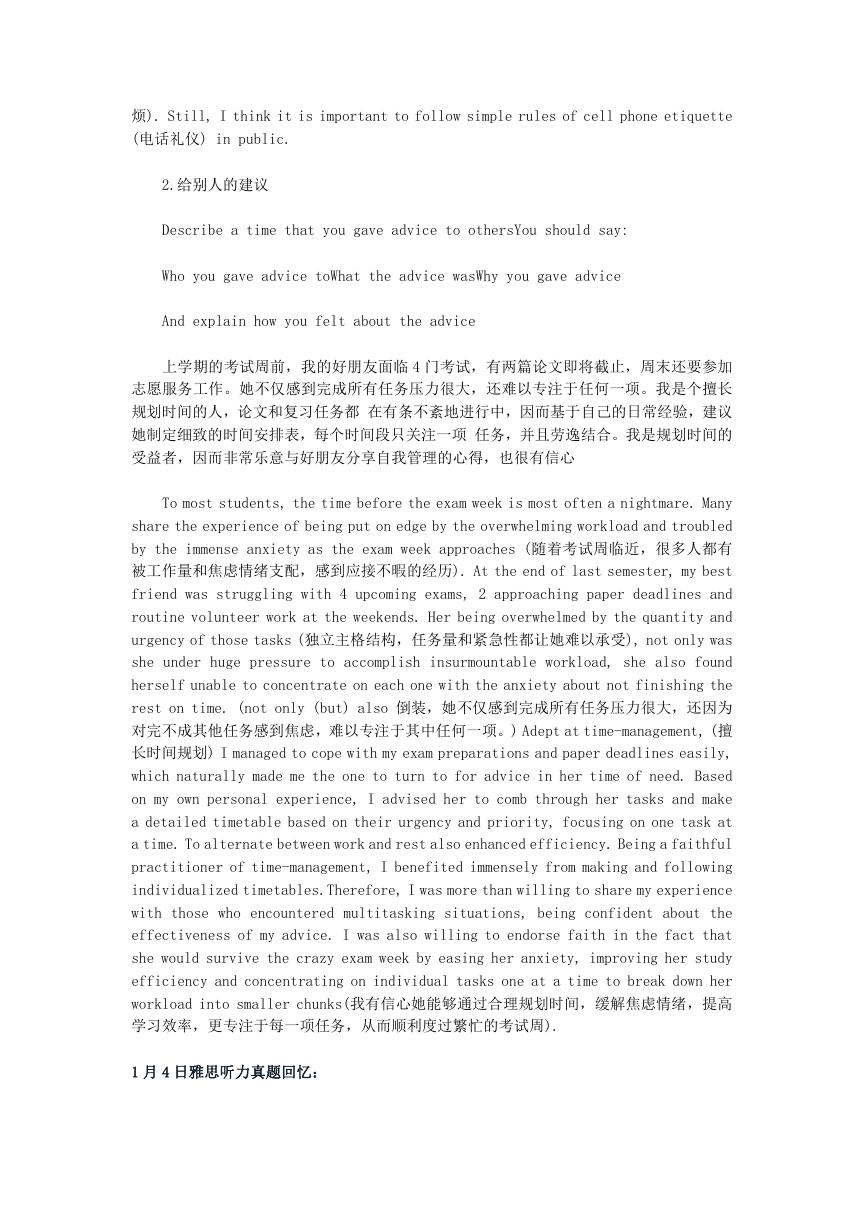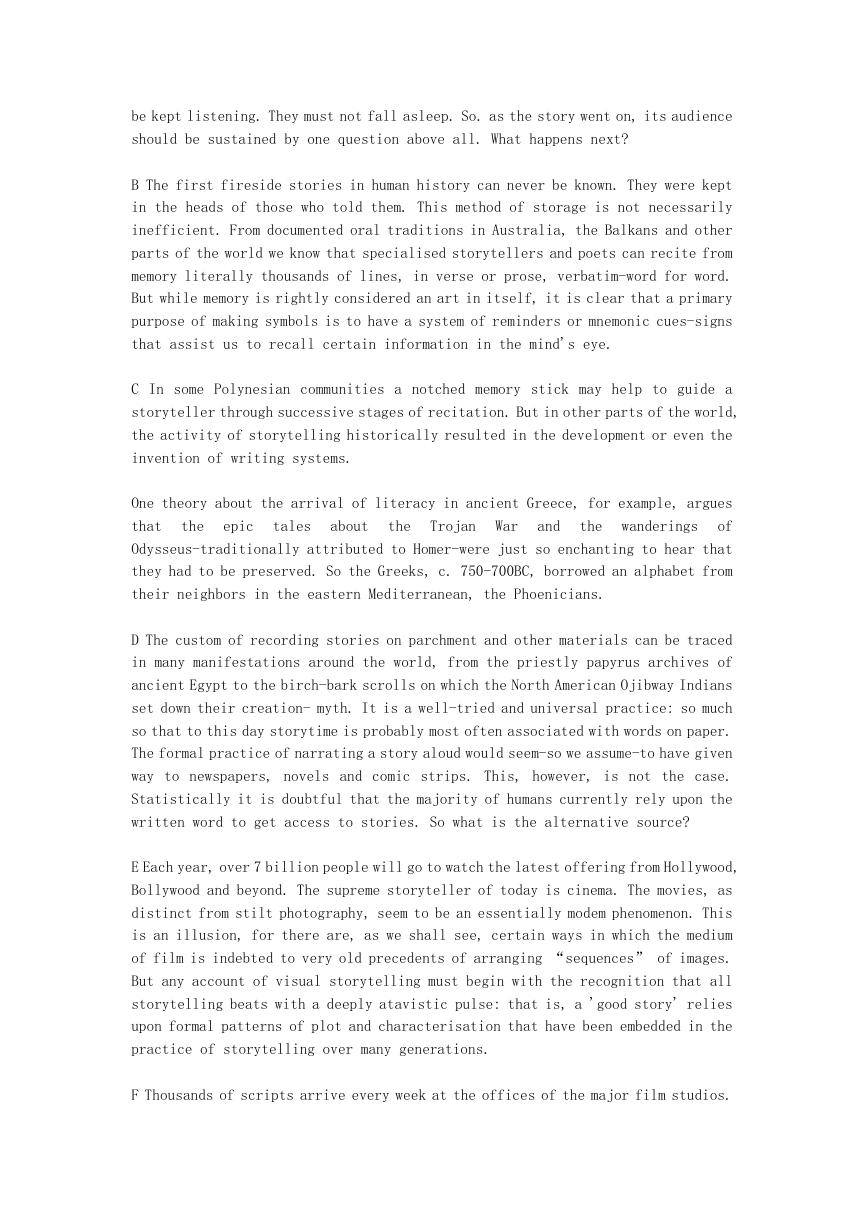2020 年 1 月 4 日雅思真题回忆及解析
不积跬步,无以至千里;不积小流,无以成江海。对于雅思考试而言,每天进步一点点,
基础扎实一点点,通过考试就会更容易一点点。无忧考网搜集整理了 2020 年 1 月 4 日雅思
真题回忆及解析,希望对大家有所帮助。以下内容仅供参考。
1 月 4 日雅思口语真题回忆:
1.公共场合接陌生人电话
Describe an experience when you received a call from someone you don’t know
in the public place
You should say:
When you received this callWhere you received this callWhat you were doing at
thattime What the call was about
And explain how you felt about the call
几周前的一个周日,我和朋友在咖啡馆的时候,我接到了一个陌生人的电话。那是一
个出租车司机的电话,当天早些时间我在出租车上掉了钱包。虽然我一般不喜欢接陌生来
电或是在公共场合打电话,那一天我很幸运接到那个电话,可以找回钱包,因为钱包里有
很多证件。
I usually prefer to talk to people in quiet and convenient places. And I have
also had some annoying experiences of hearing people around me chatting for a long
time, but I recently had a time in which I had to make a call in a public place
and I was thrilled to receive the call. A few weeks ago,on a Sunday, I took a taxi
to pick up my friend. I took my wallet out to check for something and probably just
conveniently left it on the seat. When I got out of the taxi, I was in such a hurry
(很匆忙) that I didn’t check everything. I didn’t even realize I had forgotten
the wallet until I was in the café with my friend later that day. I had the taxi
receipt with me so I immediately called the company to see if they could reach out
(联系) to the taxi driver. Usually, I don’t pick up phone calls with unknown number,
you know how most of those calls are cold calling companies. That day, I was anxiously
looking at my phone all the time in case I missed any. After around 20 minutes,
I got this phone call with unknown number. I picked it up immediately. That was
the call from the taxi driver telling me he has my wallet. I nearly cried out, cause
I have all my important IDs and cards inside it. I moved to a corner table so that
I wouldn’t disturb people sitting near us. He checked some information with me
and told me he would meet me downtown later. I was lucky to get this phone call
that day and finally get my wallet back as it saved me a ton of hassle (很多麻
�
烦). Still, I think it is important to follow simple rules of cell phone etiquette
(电话礼仪) in public.
2.给别人的建议
Describe a time that you gave advice to othersYou should say:
Who you gave advice toWhat the advice wasWhy you gave advice
And explain how you felt about the advice
上学期的考试周前,我的好朋友面临 4 门考试,有两篇论文即将截止,周末还要参加
志愿服务工作。她不仅感到完成所有任务压力很大,还难以专注于任何一项。我是个擅长
规划时间的人,论文和复习任务都 在有条不紊地进行中,因而基于自己的日常经验,建议
她制定细致的时间安排表,每个时间段只关注一项 任务,并且劳逸结合。我是规划时间的
受益者,因而非常乐意与好朋友分享自我管理的心得,也很有信心
To most students, the time before the exam week is most often a nightmare. Many
share the experience of being put on edge by the overwhelming workload and troubled
by the immense anxiety as the exam week approaches (随着考试周临近,很多人都有
被工作量和焦虑情绪支配,感到应接不暇的经历). At the end of last semester, my best
friend was struggling with 4 upcoming exams, 2 approaching paper deadlines and
routine volunteer work at the weekends. Her being overwhelmed by the quantity and
urgency of those tasks (独立主格结构,任务量和紧急性都让她难以承受), not only was
she under huge pressure to accomplish insurmountable workload, she also found
herself unable to concentrate on each one with the anxiety about not finishing the
rest on time. (not only (but) also 倒装,她不仅感到完成所有任务压力很大,还因为
对完不成其他任务感到焦虑,难以专注于其中任何一项。) Adept at time-management, (擅
长时间规划) I managed to cope with my exam preparations and paper deadlines easily,
which naturally made me the one to turn to for advice in her time of need. Based
on my own personal experience, I advised her to comb through her tasks and make
a detailed timetable based on their urgency and priority, focusing on one task at
a time. To alternate between work and rest also enhanced efficiency. Being a faithful
practitioner of time-management, I benefited immensely from making and following
individualized timetables.Therefore, I was more than willing to share my experience
with those who encountered multitasking situations, being confident about the
effectiveness of my advice. I was also willing to endorse faith in the fact that
she would survive the crazy exam week by easing her anxiety, improving her study
efficiency and concentrating on individual tasks one at a time to break down her
workload into smaller chunks(我有信心她能够通过合理规划时间,缓解焦虑情绪,提高
学习效率,更专注于每一项任务,从而顺利度过繁忙的考试周).
1 月 4 日雅思听力真题回忆:
�
Section 1
场景分类
旅游场景
内容概述
购买机票
题目回忆
1.contact phone number: 07958477222
2.best time to call: Thursday morning
3.number of people traveling: 7
4.date of return:22 November
5.purpose of the trip: wedding
6.special requirement: one passenger cannot eat cheese
7.last county visited: India
8.purpose of last foreign trip: business
9.consumer's comment on the website: too slow
10. email address: carter.s@speedtech
.com
参考听力
C4T4S2
Section 2
场景分类
其他场景
�
内容概述
天文馆
题目回忆
11-12. What are the two advantages of memberships?
A. members can get discounts
E. members can join activities with their guests 13-14. What are the two activities
that members can enjoy C. Running courses about astronomy D. They organize special
camping trips
15-20 地图题
15.G
16.B
17.A
18.C
19.D
20.E
参考听力
C6T4S2.
Section 3
场景分类
学术场景
内容概述
讨论错觉图像
题目回忆
�
21.C
22-25 暂缺
26.distorted
27.false horizon
28.theme architecture
29.shorter
30.暂缺
参考听力
C13T4S3.
Section 4
场景分类
学术场景
内容概述
塑料的降解
题目回忆
31.people in design industry always use plastic
32.plastic is common in packaging and building materials
33.window frames begin to degrade and feel sticky after 10 ye
34.... is destroyed by fire
35.in some parts of Asia, some valuable old photographs Begin to degrade
36.in dolls, plastic begins to degrade if there is a change in color
37.plastic is transportable and cheap
�
38.one way to preserve plastic is by freezing it
39.cost and space
40.by preserving plastic, we preserve history
参考听力
C11T4S4.
1 月 4 日雅思阅读真题回忆:
Passage 1
题目
大山雀
话题分类
生物科学类
题型及对应数量
判断题 6+填空题 7
内容回忆
暂缺
题目回忆
1-6 判断题
1.T
2.NG
3.T
4.F
5.F
�
6.NG
7-13 填空题
7.moss
8.feathers
9.third
10.caterpillars
11.three/3 weeks
12.26 grams
13.imbalance
参考阅读
C9T1P3.
Passage 2
题目
人类讲述故事的发展
话题分类
历史文明类
题型及对应数量
段落匹配题 5+信息匹配题 4+填空题 4
内容回忆
Storytelling, From Prehistorie Caves To Modern Cinemas
A It was told, we suppose, to people crouched around a fire: a tale of adventure,
most likely-relating some close encounter with death; a remarkable hunt, an escape
from mortal danger; a vision, or something else out of the ordinary. Whatever its
thread, the weaving of this story was done with a prime purpose. The listeners must
�
be kept listening. They must not fall asleep. So. as the story went on, its audience
should be sustained by one question above all. What happens next?
B The first fireside stories in human history can never be known. They were kept
in the heads of those who told them. This method of storage is not necessarily
inefficient. From documented oral traditions in Australia, the Balkans and other
parts of the world we know that specialised storytellers and poets can recite from
memory literally thousands of lines, in verse or prose, verbatim-word for word.
But while memory is rightly considered an art in itself, it is clear that a primary
purpose of making symbols is to have a system of reminders or mnemonic cues-signs
that assist us to recall certain information in the mind's eye.
C In some Polynesian communities a notched memory stick may help to guide a
storyteller through successive stages of recitation. But in other parts of the world,
the activity of storytelling historically resulted in the development or even the
invention of writing systems.
the
epic
One theory about the arrival of literacy in ancient Greece, for example, argues
that
of
Odysseus-traditionally attributed to Homer-were just so enchanting to hear that
they had to be preserved. So the Greeks, c. 750-700BC, borrowed an alphabet from
their neighbors in the eastern Mediterranean, the Phoenicians.
wanderings
Trojan
tales
about
the
War
and
the
D The custom of recording stories on parchment and other materials can be traced
in many manifestations around the world, from the priestly papyrus archives of
ancient Egypt to the birch-bark scrolls on which the North American Ojibway Indians
set down their creation- myth. It is a well-tried and universal practice: so much
so that to this day storytime is probably most often associated with words on paper.
The formal practice of narrating a story aloud would seem-so we assume-to have given
way to newspapers, novels and comic strips. This, however, is not the case.
Statistically it is doubtful that the majority of humans currently rely upon the
written word to get access to stories. So what is the alternative source?
E Each year, over 7 billion people will go to watch the latest offering from Hollywood,
Bollywood and beyond. The supreme storyteller of today is cinema. The movies, as
distinct from stilt photography, seem to be an essentially modem phenomenon. This
is an illusion, for there are, as we shall see, certain ways in which the medium
of film is indebted to very old precedents of arranging “sequences” of images.
But any account of visual storytelling must begin with the recognition that all
storytelling beats with a deeply atavistic pulse: that is, a 'good story' relies
upon formal patterns of plot and characterisation that have been embedded in the
practice of storytelling over many generations.
F Thousands of scripts arrive every week at the offices of the major film studios.
�
















 2023年江西萍乡中考道德与法治真题及答案.doc
2023年江西萍乡中考道德与法治真题及答案.doc 2012年重庆南川中考生物真题及答案.doc
2012年重庆南川中考生物真题及答案.doc 2013年江西师范大学地理学综合及文艺理论基础考研真题.doc
2013年江西师范大学地理学综合及文艺理论基础考研真题.doc 2020年四川甘孜小升初语文真题及答案I卷.doc
2020年四川甘孜小升初语文真题及答案I卷.doc 2020年注册岩土工程师专业基础考试真题及答案.doc
2020年注册岩土工程师专业基础考试真题及答案.doc 2023-2024学年福建省厦门市九年级上学期数学月考试题及答案.doc
2023-2024学年福建省厦门市九年级上学期数学月考试题及答案.doc 2021-2022学年辽宁省沈阳市大东区九年级上学期语文期末试题及答案.doc
2021-2022学年辽宁省沈阳市大东区九年级上学期语文期末试题及答案.doc 2022-2023学年北京东城区初三第一学期物理期末试卷及答案.doc
2022-2023学年北京东城区初三第一学期物理期末试卷及答案.doc 2018上半年江西教师资格初中地理学科知识与教学能力真题及答案.doc
2018上半年江西教师资格初中地理学科知识与教学能力真题及答案.doc 2012年河北国家公务员申论考试真题及答案-省级.doc
2012年河北国家公务员申论考试真题及答案-省级.doc 2020-2021学年江苏省扬州市江都区邵樊片九年级上学期数学第一次质量检测试题及答案.doc
2020-2021学年江苏省扬州市江都区邵樊片九年级上学期数学第一次质量检测试题及答案.doc 2022下半年黑龙江教师资格证中学综合素质真题及答案.doc
2022下半年黑龙江教师资格证中学综合素质真题及答案.doc